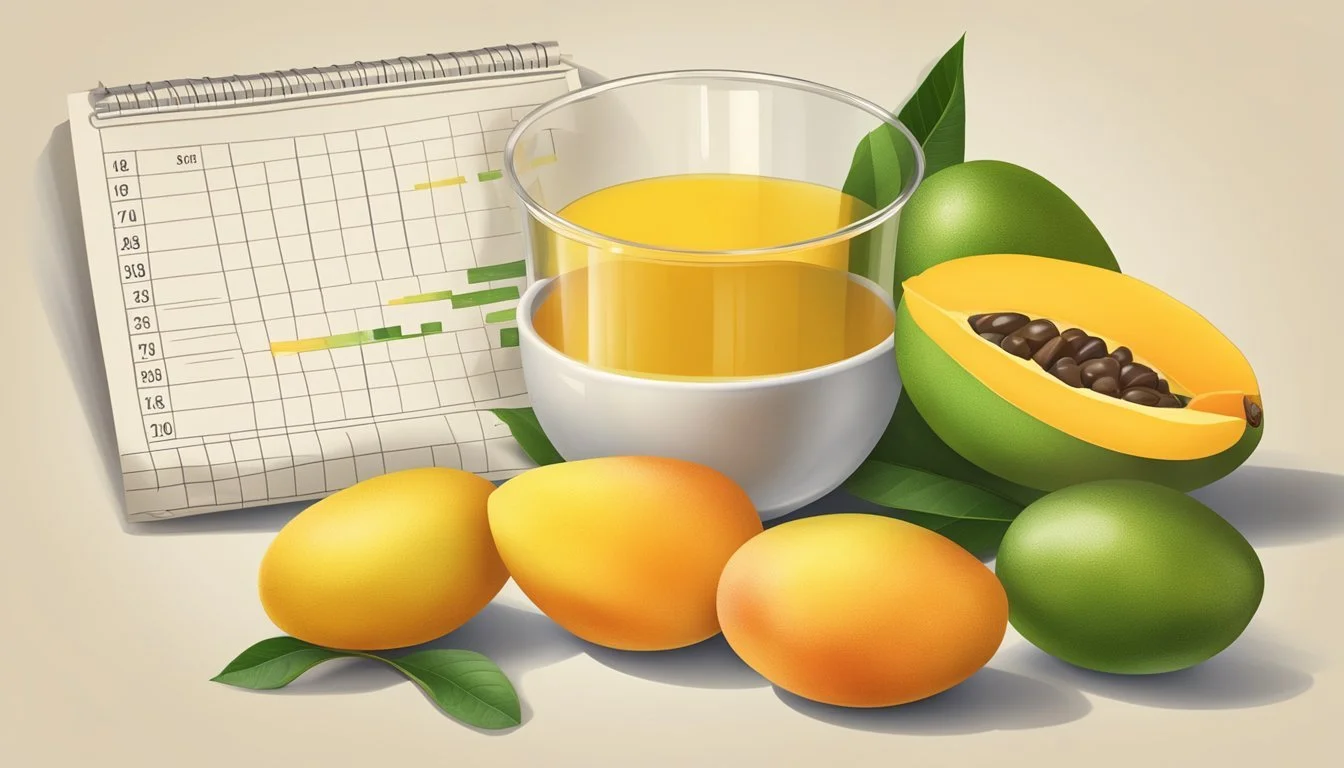How Many Cups of Mango to Meet Your Vitamin A Needs
Mangos are a highly nutritious fruit rich in vitamins and minerals, and they are particularly known for their vitamin A content. Vitamin A is crucial for maintaining healthy vision, skin, and immune system function. According to nutritional data, one cup of mango can provide about 35% of the daily vitamin A needs for an average adult. Given its delicious taste and health benefits, incorporating mango into one's diet can be both enjoyable and beneficial.
Determining the adequate intake of mango for vitamin A depends on several factors including age, gender, and dietary requirements. For those looking to meet their vitamin A needs primarily through this fruit, it is essential to consider the recommended dietary allowances for their specific demographic. Since an average cup of mango offers a substantial percentage of the daily vitamin A requirement, individuals can plan their consumption accordingly to avoid both deficiency and excessive intake. It is generally advisable to consume a variety of foods to meet nutritional needs, as this promotes a more balanced diet.
Nutritional Profile of Mangoes
Mangoes are highly regarded for their rich vitamin and mineral content, and are particularly noted for their substantial levels of vitamin A, vitamin C, and dietary fiber. The specific components of mangoes contribute to their status as a nutrient-dense fruit.
Vitamins and Minerals Content
Vitamin A: One cup of mango provides about 8-10% of the daily recommended intake.
Vitamin C: A single serving supplies 50% of the daily requirement.
Vitamin E & Vitamin K: Present in smaller amounts compared to vitamins A and C.
Folate: Mangoes contain folate, essential for DNA synthesis.
Potassium & Magnesium: These minerals contribute to overall heart health.
Copper: Important for red blood cell production, found in mangoes in trace amounts.
Caloric and Sugar Composition
Calories: A cup of mango chunks has roughly 99 calories.
Natural Sugar: The same serving contains about 23 grams of sugar, which is a natural sugar.
Carbohydrates: This consists predominantly of carbs, with a cup providing around 25 grams.
Mango-Specific Compounds
Mangiferin: A powerful antioxidant unique to mango.
Polyphenols: Mangoes are rich in polyphenolic compounds like mangiferin, which have antioxidant properties.
Carotenoids: They are a good source of beta-carotene, zeaxanthin, and lutein, which support eye health.
Health Benefits of Mangoes
Mangoes are not only a delicious tropical fruit but also a powerhouse of nutrients that contribute to various health benefits. They are particularly noted for their high content of vitamin A and C.
Immune System Support
Mangoes are a robust source of vitamin A, an essential nutrient for maintaining a healthy immune system. With a single cup of mango providing approximately 10% of the daily vitamin A needs, incorporating this fruit into one's diet can contribute to the body's defense against infections and diseases.
Skin and Hair Health
Rich in vitamin A and vitamin C, mangoes aid in promoting healthy skin and hair. These vitamins are crucial for the repair and maintenance of skin cells and hair, while vitamin C is instrumental in the production of collagen, which provides structure to skin and hair.
Digestive Health Advantages
Mangoes contain dietary fiber, both soluble and insoluble, which supports a healthy digestive system. The presence of amylase, an enzyme in mangoes, helps break down and digest food effectively, while the fiber content may help prevent constipation and promote regularity.
Impact on Heart Health
The potassium and fiber in mangoes can have a positive impact on heart health. Potassium helps regulate blood pressure and maintain healthy blood vessels, while fiber can assist in reducing blood cholesterol levels. Additionally, magnesium in mangoes also supports cardiovascular health.
Cancer and Chronic Diseases Prevention
Mangoes are rich in antioxidants, such as polyphenols and carotenoids, which may play a role in reducing the risk of certain cancers and chronic diseases. These antioxidants help protect cells from free radical damage, which can lead to inflammation and disease development. Vitamin C, a powerful antioxidant found in mangoes, is also known for its anticancer properties.
Understanding Mango Consumption
When considering mango consumption for vitamin A intake, one should be aware of the proper serving sizes, the nutritional impact of mangos in various forms, potential allergens, and effective ways to incorporate this fruit into one's diet.
Proper Serving Sizes
One cup of fresh mango, approximately 165 grams, provides about 10% of the daily vitamin A needs. It is essential to recognize that this quantity is roughly equivalent to one mango. To meet nutritional needs without excessive calorie and sugar intake, moderation is key. A balanced diet considers the appropriate portion of mangoes alongside other fruits and vegetables.
Mango in Different Forms
Mango can be consumed in diverse forms, such as fresh, dried, freeze-dried, or even as part of a recipe, like a smoothie or salsa. It's crucial to note that drying processes concentrate the sugar content and carbohydrates, making dried mango more calorie-dense. For those monitoring their sugar intake, fresh mango may be a more suitable choice.
Potential Allergens and Irritants
Mango skin contains urushiol, the same chemical found in poison ivy, which can trigger allergic reactions in sensitive individuals. To avoid potential irritants, it's best to peel the mango before consumption. Additionally, allergic responses to the mango flesh itself are possible, though less common.
Incorporating Mango Into Your Diet
Mango can be a delicious and nutritious addition to one's diet. Due to its high water content and dietary fiber, it can aid in hydration and digestion. Incorporating mango can be as simple as including it in a fruit salad or blending it into a smoothie. To complement its sweetness, mango can also be added to savory dishes such as salsa, balancing its natural sugars with other flavors.
Risks and Considerations
When considering mango intake for vitamin A, it is vital to be aware of the potential risks and factors that need careful consideration to avoid adverse effects on health.
Impact of Excessive Consumption
Excessive consumption of mangoes can lead to an intake of high sugar levels and increased calories, which may impact blood sugar levels, particularly in individuals with diabetes. Overconsumption can also potentially lead to weight gain due to the caloric content of mangoes.
Interactions With Health Conditions
Mangoes contain mangiferin, a compound that may interact with various health conditions. While moderation in mango consumption can be beneficial by providing fiber and nutrients, individuals with certain chronic diseases such as heart disease should consult healthcare providers about appropriate serving sizes to reduce the risk of exacerbating their condition.
Mango and Medication Interactions
The nutritional components of mangoes might interfere with certain medications. Patients should discuss with their physicians to understand if mangiferin or other components of mangoes could affect the efficacy of their medications, particularly those related to blood sugar levels and heart disease.
Selection and Storage of Mangoes
Proper selection and storage are crucial to maintain the nutritional quality of mangoes. One should choose fresh mango that is ripe but firm and store it at the correct temperature. Dried mango is also an option but should be consumed in smaller quantities (1/2 cup is one serving) due to the higher concentration of sugar and calories per serving compared to fresh mango.
Cultural and Botanical Insights
Mangifera indica, commonly known as the mango, is not only a nutritionally rich fruit but also deeply embedded in various cultures. It is recognized for its sweet taste and vibrant yellow hue, often referred to as the "king of fruits."
Mango Varieties and Origins
The mango tree, belonging to the drupe category, originated in Southeast Asia and India over 4,000 years ago. With hundreds of types of mangoes available worldwide, each variety exhibits distinct characteristics in flavor, size, and color.
Alphonso: Prominent in India, prized for its sweetness and non-fibrous, juicy pulp.
Kent: Originating from Florida, it is known for its large size and sweet, rich flavor.
Ataulfo: Also called Champagne mango, these are small, yellow, and noted for their creamy texture and intense sweetness.
Each variety carries a unique profile that contributes to its widespread use in culinary traditions across different regions.
Mango in Culinary Traditions
Mangoes are a versatile fruit utilized in an array of culinary applications ranging from sweet to savory. They are prevalent in tropical countries but have gained popularity worldwide.
Raw Mango: Often used in India to make pickles or as a souring agent in dishes.
Ripe Mango: Incorporated in smoothies, desserts, and salsas for its sweetness.
Chutney and Curry: Mangoes are a key ingredient in chutneys and some curries, providing a blend of sweet and tart flavors.
The use of mangoes in culinary traditions spans continents, reflecting their international appeal and adaptability in various recipes.
Comparative Analysis
In evaluating the vitamin A content in mangos, it's crucial to compare them with other fruit counterparts to determine their relative nutritional advantage.
Mango vs Other Fruits
Mangos are a powerhouse of vital nutrients, particularly excelling in vitamin A content compared to many other fruits. A standard serving of mango provides about 35% of the daily recommended intake of vitamin A.
Peaches, another fruit high in vitamin A, offer roughly 10% for the same serving size. When comparing with oranges, which are often celebrated for their vitamin content, mangos contain about 15 times more vitamin A per serving.
Apples, commonly consumed for their fiber and vitamin C content, fall behind considerably in vitamin A, offering a negligible amount in comparison to mangos.
In terms of antioxidants, mangos are comparable to fruits like blueberries and strawberries, although the latter may have a slight edge regarding certain types of antioxidants.
For fiber, while fruits like apples and pears with their skin have a higher content, mangos still contribute a decent amount, with a single cup offering around 3 grams of dietary fiber.
As for minerals, mangos provide magnesium and potassium, but they are not as high as in some other fruits like bananas, which are a high-potassium fruit.
When looking at overall nutrition, mangos are a rich source of vitamins and minerals and can be a valuable addition to a balanced diet, particularly for those looking to boost their vitamin A intake alongside other nutritive benefits.
Summary and Recommendations
Mangoes are a valuable source of nutrition and have a multitude of health benefits. Rich in vitamins and dietary fiber, they contribute positively to one’s diet when consumed in moderation. Specifically, for vitamin A – which is crucial for a healthy immune system and good vision – mango can be an excellent source.
Vitamin A Content: A single cup of mango supplies approximately 10% of an individual's daily vitamin A requirement. Given that vitamin A promotes eye health and supports the immune system, including mango in the diet can be beneficial.
Recommended Intake for Vitamin A: To adequately meet one's daily vitamin A needs through mangoes, an individual should aim to include approximately 2 cups of sliced mangoes in their diet, which would yield about 20% of the daily value for this essential vitamin.
Health Benefits: In addition to the nutrient's specific role in maintaining good vision and fortifying the immune system, the dietary fiber in mangoes aids in digestion and can contribute to heart health.
Moderation is Key: Although mangoes offer numerous health benefits, they should be consumed in moderation due to their sugar content. A balanced approach to consumption helps maintain healthy blood sugar levels and prevents dietary excesses.
Inclusion in Diet: People can incorporate mango into meals and snacks in various ways, such as blending it into smoothies, adding it to salads, or enjoying it as a satisfying dessert. However, one should always consider the individual's overall dietary needs and restrictions.








